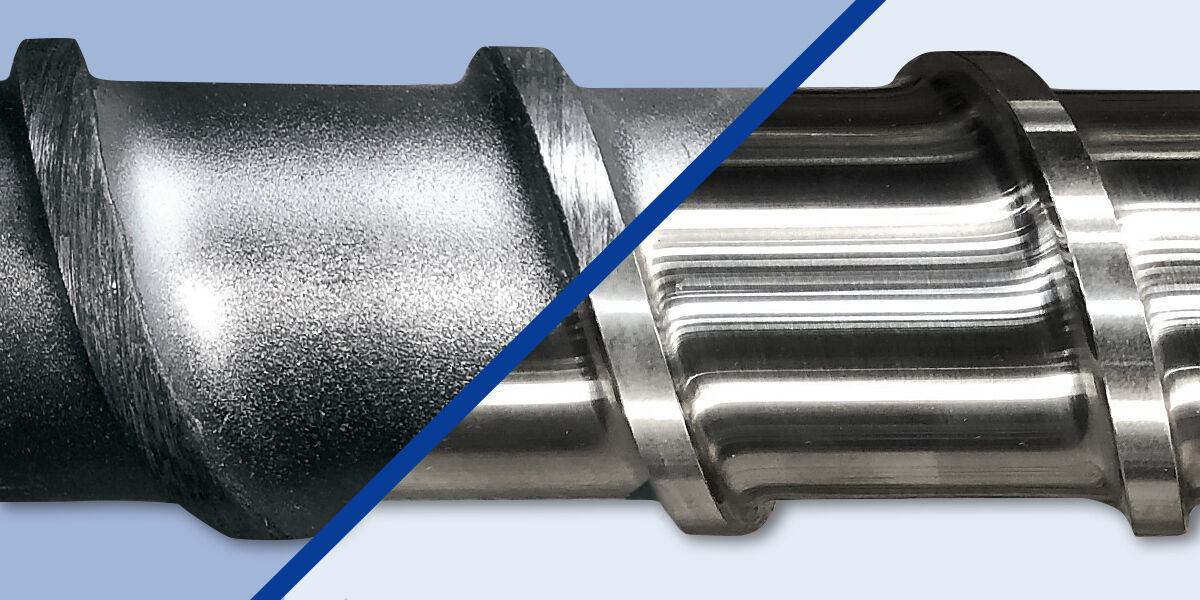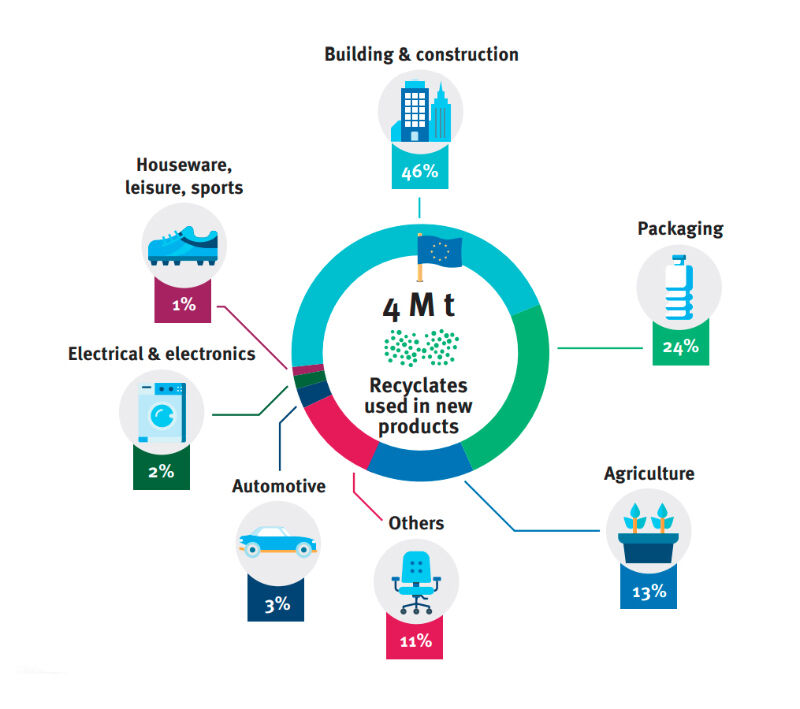
Increasing recycling content: Challenges and ways forward in plastics extrusion
In the plastics industry, the circular economy has so far been anything but smooth. In Europe, for example, around two-thirds of end consumers' plastic waste was disposed of in landfills or thermally recycled in 2020. These valuable resources are thus lost to the circular economy.
Just one example of many. Sometimes there is a lack of well-organized recycling streams, sometimes legal requirements stand in the way of the recovery of recycled goods. Yet a functioning recycling economy for plastic products can make a valuable contribution in terms of climate neutrality, resource conservation and environmental protection. In order to make decisive steps forward here, the right appreciation of the material, political guidelines and technologies adapted to the challenge are needed.
Currently, we are not taking advantage of the recycling potential of plastic.
(Source: Plastics Europe - Plastics - the facts 2021)
of post-consumer plastic waste in the European Economic Area is disposed of in landfills.
of post-consumer plastic waste is burned.
of post-consumer plastic waste is recycled.
Plastics: recyclable material instead of waste
No longer viewing used plastic products as waste, but as a valuable raw material, could be a key to higher recycling rates. Europe and North America are therefore discussing the idea of prescribing certain recycled content for all new plastic products. In its plastics strategy, for example, the EU Commission calls for a "significant " increase in the proportion of recycled material by 2030. Plastics producers are also supporting a mandatory recycled content quota in plastic packaging, and many major brands have already committed to using appropriate quantities of used plastics in packaging.
Regardless of how high the quota will ultimately be, one thing is certain: In the future, significantly more plastic will have to be recycled - also because otherwise there simply won't be enough raw material available. There are various reasons why the increase to the target value is not trivial.
What is recyclate?
Recyclates are secondary raw materials which, depending on their condition, can be sorted, cleaned and reprocessed and then used again in production. A distinction is made between recyclates from industrial waste ("post industrial recyclates") and from end-user waste ("post consumer recyclates").
More information: Guideline Recyclate of the Forum Rezyklat
Challenge: Economical recyclate processing
For manufacturers of plastic products made from recyclate, profitability and sustainability are often not yet in a healthy relationship today. There are various reasons for this: The price of virgin material fluctuates strongly, so that recyclate is even more expensive at times. Market-compliant regulations could help in the short term.
Another reason for the limited economic efficiency is the cost- and resource-intensive processing of used plastics by washing, drying and regranulating. "This is where we, with our expertise in plastics extrusion, are called upon to develop flexible and robust solutions that also make cirular economy less expensive again," says Tim Pohl, responsible for sustainability and new business development at Reifenhäuser. "Our goal is to use second-life plastic with as few processing steps as possible, preferably only pre-sorted." Reifenhäuser offers line solutions accordingly: For example, we can extrude a thermoforming sheet or a spunbond nonwoven directly from shredded PET bottelflakes, or we directly extrude a blown film from collected film flakes."
"Our goal: to use second-life plastics with just a few reprocessing steps."

Challenge: Fluctuating quality in raw material
Processors face another challenge in the manufacture of extruded plastic products from recyclates: they generally cannot increase their proportion at will. One reason for this is the inhomogeneous material composition of the recyclates. Although they are pre-sorted and cleaned, they have different viscosities, colors, contamination levels and foreign substances. "If you add large quantities of recyclate, the conditions in production change," says Christoph Lettowsky, Senior Product Manager at Reifenhäuser. "As a plant manufacturer, however, we have good answers to this: with the right technology, we make producers more independent of the input quality of the recyclate they process."
Processing granulate and fluff
The blown film line EVO Fusion with twin screw extruder can process not only granulate but also fluff (film shreds) directly into new films, - without the film waste first having to be processed into granulate in an energy-intensive process.
For example, processors can use the EVO Fusion blown film line to process heavily contaminated and inhomogeneous recyclates, of which they were previously only able to add a small proportion to virgin material. The recycling content can thus be significantly increased in production. Lettowsky: "This means a very big step forward in recycling."
Challenge: Increasing component wear due to recyclate
However, high recyclate content in production is not only a challenge for the process, but also a stress test for the plasticizing unit. Impurities from organic and inorganic compounds in recyclates have a strong abrasive effect and thus accelerate wear. "The higher the recycling content, the greater the stress on the melt-carrying components," relates Udo Nuber, who advises customers on suitable wear protection at Reifenhäuser Reiloy, the Group's specialist for screws and barrels.
Blown film from recycled material: extending cleaning intervals
Even high-quality recyclates soil the die, cooling ring and other line components faster than virgin material. With special solutions from Reifenhäuser, blown film lines remain operational longer.
The extruder plays a decisive role here, as depending on the quality of the recyclate it must also reliably process impurities and wear-inducing ingredients. "For the processing of recyclate, we therefore rely on highly wear-resistant screws and barrels, which we develop and manufacture in-house - just like all quality-imparting components," explains Nuber. "Because we are the only manufacturer to also develop the hard alloys for wear protection for this component ourselves, we have in-depth know-how here and achieve a service life advantage of at least 30 percent compared to our market competitors. This has been shown by our own and independent benchmark studies of our alloy systems at a university."
Comparison: screw with wear due to recyclate (left) and new screw

Recycling: obstacles for products made from recyclate
If you design the line accordingly, it is therefore quite technologically feasible to manufacture plastic products with a high recycled content. "The other question is whether I am allowed to process recyclate at all, for example if I manufacture products for the food sector - high legal standards apply here," explains sustainability expert Tim Pohl. For example, all materials that come into contact with food in the European Union require special certification from the European Food and Safety Authority (EFSA). Until now, it has often been challenging for producers to obtain this certification for materials made from recyclate - another reason for the low recyclate content in such products to date.
However, there are already technical solutions that reconcile the high requirements and second-life plastics: Reifenhäuser, for example, has developed a solution for the particularly energy-efficient production of recycled PET film that meets the high requirements of the EFSA. This makes it possible to produce a food-safe film from up to 100 percent PET bottle flakes, with a convincing CO2 balance thanks to energy-efficient direct extrusion. "The end product, for example a meat tray, meets the highest hygiene standards and can be safely used for packaging, even in direct contact with food," explains Mark Schuster, product manager PET sheet at Reifenhäuser Cast Sheet Coating.
Where used plastics are currently used

Source: Plasticseurope
According to an industry overview by PlasticsEurope, the pan-European association of plastics producers, products made from recycled plastics are currently used mainly in construction, household and industrial packaging and agriculture. However, the study's authors express optimism that with the help of innovative recycling and sorting technologies, the quality of recyclates will increase, and with it the range of applications in which they can be used. "The medium- to long-term demand for recyclate applications cannot yet be accurately predicted," adds Reifenhäuser's sustainability expert Tim Pohl. "Our answer to this is highly flexible extrusion lines that can safely process a wide range of different raw materials. This allows processors to quickly switch between different applications when the market demands it."
Opportunity: Substitution of materials in packaging
This does not necessarily involve the 1:1 replacement of virgin material with recyclate. Processors can also replace virgin material of one plastic with recycled material of another plastic within an application. For example, using the appropriate spunbond technology, carrier bags and transport packaging for bulk goods can be made from recycled PET instead of virgin polypropylene. "In theory, recyclate can be used for very many different products," Pohl explains. "It's partly a question of the effort it takes to make the recyclate usable again, and partly a question of the application: where do I want to use the product made from recyclate? We are happy to advise our customers on these considerations."



